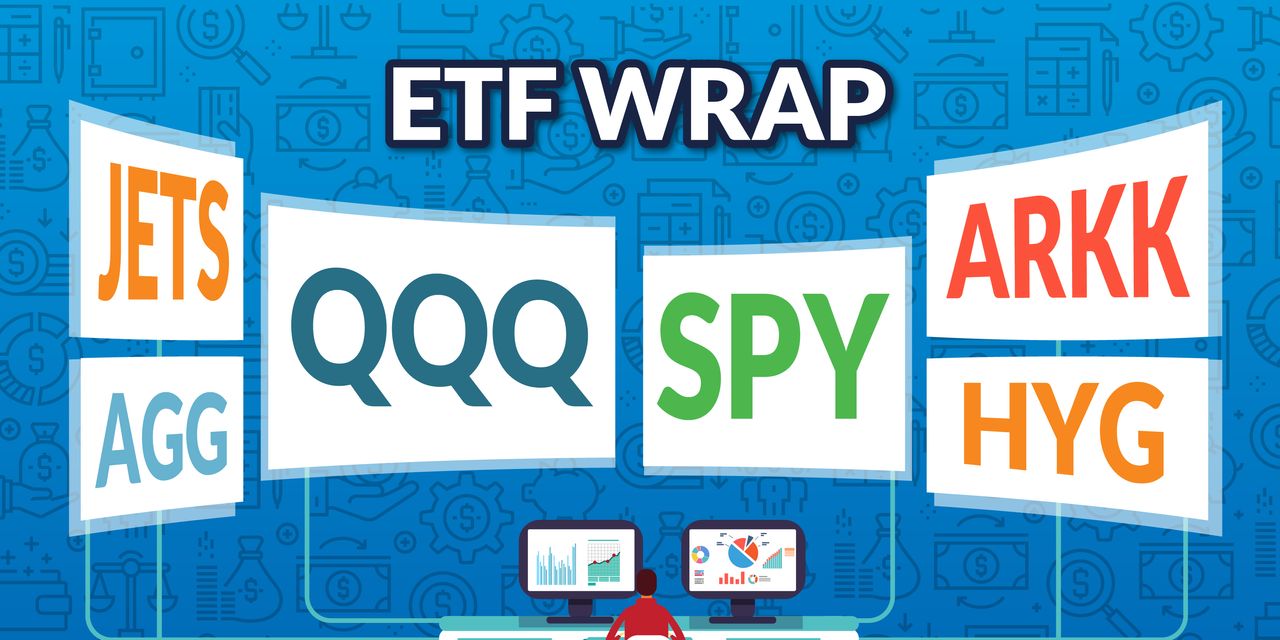Hello! This is markets reporter Isabel Wang stepping in to cover ETF Wrap for MarketWatch’s Christine Idzelis, who will be back next week. In this week’s edition, I spoke with Todd Rosenbluth, head of research at VettaFi, about a potential change in the leader table for bond ETFs and other dynamics driving interest in fixed-income ETFs.
Please send tips, or feedback, and find me on Twitter at @isabelxwang and find Christine at @cidzelis, or [email protected].
Exchange-traded funds that invest in bonds are in the spotlight. With ample liquidity and tax efficiency benefits, bond ETFs are attracting capital.
And one fixed-income ETFs appears poised to become the new bond ETF king, according to Todd Rosenbluth, head of research at VettaFi. The Vanguard Total Bond Market ETF
BND,
has garnered about $80.97 billion in assets as of July 21, according to FactSet data. This is slightly below the $81.4 billion the current bond ETF leader, iShares Core Aggregate Bond ETF
AGG,
has boasted.
BND has been closing the gap with AGG. Rosenbluth attributed the “relative success” of the Vanguard Total Bond Market ETF to a shift in investment strategies. iShares, however, remains the industry leader across all ETFs, as well as fixed income ETFs, as of mid-July.
“One is that we’ve seen investors that have long held active or long held mutual funds have been rotating away from those strategies,” said Rosenbluth in a phone interview on Thursday. “And at the same time, we are seeing demand for fixed income ETFs. What is likely happening is that given that investors are seeing the worst returns for their bond funds in decades, they’re taking advantage of the opportunity to tax-loss harvest…And BND is a beneficiary of that.”
According to Rosenbluth, the Vanguard Total Bond Market ETF is also a likely beneficiary of Vanguard’s mutual find lineup. Vanguard shareholders can shift easily from using a mutual fund share class to an ETF share class, which has probably contributed to BND’s ETF inflows, he said.
“Vanguard allows for a swap exchange so that investors that are in the VBTLX
VBTLX,
which is the mutual fund, are able to go into the ETF,” said Rosenbluth. “If you’re comfortable with ETFs as an investor and how they trade, then it’s an easy savings. We’re also seeing advisers increasingly use bond ETFs in their asset allocation strategy. Some of them are getting more defensive, and if you’re becoming more defensive, you increase your bond exposure.”
Both of the bond ETFs charge identical fees with three basis points expense ratios and suffered heavy losses in the first half of the year, but iShares’ 9.8% loss was “fractionally narrower than Vanguard’s 10% decline,” according to Rosenbluth.
Rosenbluth noted that while it looks like BND is soon to become the individual bond leader, “iShares still has a leading market share.”
In addition, Rosenbluth said he expects the market to see continued adoption of fixed income ETFs as the Federal Reserve continues to tighten monetary policy because of the liquidity and ease of use that bond ETFs offer relative to mutual funds. “The market share shifting away from mutual funds and towards fixed bond ETFs is likely to persist as the Fed raises interest rates,” said Rosenbluth.
Weekly ETF reads
Cathie Wood’s ARK to Close Transparency ETF (WSJ)
Dividend ETFs Keep Getting Larger. It’s Survival of the Biggest. (Barron’s)
Single-Stock Levered ETFs Are Financial Mutants (Bloomberg)
